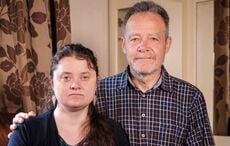Former Irish President Mary McAleese was born on this day, June 27, 1951, in Ardoyne in north Belfast. She turns 68 today!
A graduate of Queen’s University, Belfast, and Trinity College, Dublin, she worked as a respected barrister and as the first female Pro-Vice-Chancellor of Queen's University before being elected the 8th President of Ireland; the country’s second female president and the first to come from the province of Ulster or from the state of Northern Ireland.
Read more: Pope John Paul refused to shake hand of Ireland’s female president
Once voted by Forbes as the 64th most powerful woman in the world, McAleese took from her own experience of sectarian violence while growing up in Belfast to focus her presidency on “Building Bridges” and addressed issues concerning justice, social equality, social inclusion, anti-sectarianism, and reconciliation.
Having been forced to leave the Ardoyne area by loyalists during the Troubles, McAleese made great efforts to bridge the divide with the Unionist community during her 14 years in Áras an Uachtaráin, even hosting a Twelfth of July celebration in her official residence in Phoenix Park.
2nd inauguration of Mary McAleese. Ireland was the first country in history to elect two successive female presidents. #WomenMW pic.twitter.com/7Gdbw0zAoy
— Dublin Castle (@dublincastleopw) June 19, 2017
Her importance reached far beyond Ireland, however, and she held office during some monumental incidents in global history, acting with grace and courage in the face of 9/11 and leaving a hard act for current President Michael D. Higgins to follow.
In a fascinating 2011 article in the Irish Times as McAleese prepared to hand over the mantle to her predecessor, journalist Deaglan De Breadún examined her record.
“There are few politicians anywhere who could spend 14 years in office and end up more popular than when they started,” was one of De Breadún’s conclusions – and we can hardly argue with that.
He listed the obvious highlight of her 14 years—the visit of Queen Elizabeth—but I think her reception for Barack Obama just the week after was a beautifully choreographed moment, too. De Breadún also noted the McAleese response to 9/11 as a major plus.
Read more: Former Irish president so ashamed of the Church she’s considered leaving
Her comments on RTÉ radio, unscripted right after the attacks, were eloquent and deeply insightful.
It was not a time for platitudes and McAleese knew it.
She stated: “It’s a crime against the very foundations of all our humanity and our hearts .. our response to that is and has to be to stand shoulder to shoulder with our American brothers and sisters.”
McAleese had that feel and sense for the Irish abroad in a way that was clearly lacking among many other politicians back in Ireland who mouthed the platitudes but never understood it.
It was no surprise that 9/11 was still very much on her agenda when she came to New York in March 2002. In fact, the best speech I have ever heard from an Irish politician, bar none, was when McAleese spoke at our sister publication, Irish America Magazine’s, event at the Plaza Hotel.
We had canceled our usual Irish American of the Year celebration and instead went with a tribute to those who lost loved ones on 9/11.
It was clear to us that the city was still grieving after 9/11, none more so that the Irish in the fire and police services who lost so many on those torrid times.
We invited many of the grieving families who turned up in large numbers. The sense of loss, of bravery, and courage in the face of such loss was palpable.
McAleese caught the moment brilliantly.
Here is what De Breadún wrote about the occasion: “She caught the public mood … at a function in the ballroom of New York’s Plaza Hotel, which was crowded with grieving relatives and friends of firefighters and police officers of Irish origin who had perished in the inferno at the World Trade Center.”
An eyewitness to the occasion recalled the hurt and the anguish that hung like a dark mist over the crowd. McAleese rose to the occasion, reducing even seasoned fire officers and members of “New York’s finest” to tears with her words of comfort and her contention that their Irish forebears “would be proud of a modern generation who have known the easy times and comfort of prosperity but who, when tested, chose the hardest road of all”.
A huge part of her success was also down to her husband Martin McAleese who transformed that role of public spouse to one of real impact.
Yet again, Mary McAleese proves to us that she is just an amazing legend and all round super human being http://t.co/A6pbaaftDs
— Tara Siân Hayes (@tarasianhayes) June 18, 2015
Martin focused on Northern Ireland and on the Unionist and Loyalist community who felt estranged from the benefits of the peace process.
He took on the role of the counselor in chief to many of the Loyalist leaders, showed them the Irish Republic, and convinced them that there was no reason for them to fear coming south of the border.
He did a magnificent job, one that will rank with what McAleese herself achieved.
The theme of the presidency was ‘bridge building ‘ and with the Irish abroad and the Loyalist community, Mary and Martin McAleese certainly achieved that and more.
*Originally published in 2013.




Comments